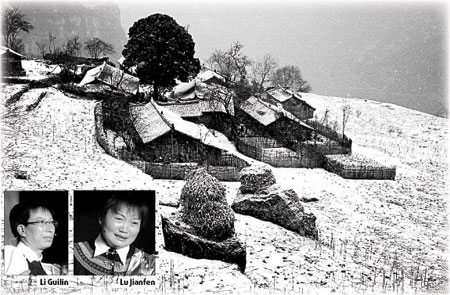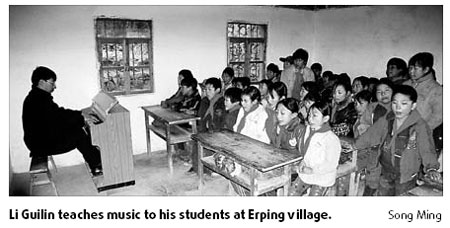Extraordinary people
|
 Erping village blanketed in snow. Song Ming |
Last Thursday, Li Guilin and his wife Lu Jianfen, from a remote mountain school stood under the spotlight in the glamorous studio of China Central Television. Together with a collection of others they were honored as "People Who Moved China in 2008" in this annual event started by CCTV in 2002.
"We have done nothing great," Li told local media. "But others think it is important."
The elementary school of Erping village stands on a precipitous cliff in Wushidaqiao township of Sichuan's Liangshan Yi prefecture. Those of its children who don't live in the village have to climb five wooden ladders to reach the school, where they spend the week before going home over the weekend. Li and his wife escort, and sometimes even carry, the children on their perilous journey to school.
Over the past nearly two decades, they have taught 149 students, among whom 22 were drawn to the school from other areas because of its kind teachers.
Li, 42, and Lu, who is a year younger, were born in Han families and grew up in Wusihe town of Ya'an city, opposite Erping village. In 1990, when Li visited the remote village, he was appalled at see how backward it was.
Before 1983, the year the simple wooden ladders were installed, local people had to descend the cliff by clinging on to the ivies. While the Dadu River at the foot of the mountain is about 600 m above sea level, Erping village is located 1,750 m above sea level.
Other mountain paths built over the years did little to ease the dangers and the village has seen few visitors. The elderly and the children seldom venture out, as every year a dozen cattle routinely fall down the cliff to their death.
The less than 500 villagers of the Yi minority have been living here for some ten generations. They grow corn, potato, bean and buckwheat on about 0.5 sq km of farm fields scattered amid giant boulders that have rolled down from the higher mountains.

"I am the son of farmers," says Li. "I know that education is the only way for an impoverished mountain area to change; it's the only way to ensure that the younger generation won't grow up as illiterates who can't even count money."
His trip prompted Li to accept the local government's offer to work as a substitute teacher at the village's elementary school. First built in 1977, the school had to stop running in 1980 as no teachers were willing to teach there.
In 1991, the school began looking for a substitute teacher but there were no takers. Li then sounded his wife about accepting the offer.
Li carried their luggage and his wife their baby son, and the couple walked some 5km before reaching the cliffs. Lu recalls she was "horrified" as she climbed the cliffs, and never imagined her husband had chosen to work in such a poor village.
"I thought of leaving several times," she says, "but I stayed when I saw his determination and the poverty of the pure and simple villagers."
With a monthly salary of barely 200 yuan, the couple spent the first half-year in a small cottage of a local villager before moving into the school.
One night, Li found a big poisonous snake near his sleeping baby's bed. He forced himself to calm down and quietly carried the baby away. Luckily, the snake made its way out through a crack in the wall.
The couple planted vegetables and raised chicken and pigs to support themselves. In the winter months, they had to make do with just pickles.
The classroom was such a rudimentary structure that sudden rain almost swept it down the cliff. Li grabbed the column and beam while Lu placed boulders to hold it in place.
In 1999, the local government put together 10,000 yuan ($1,464) to improve the school. The couple joined the whole village in the construction work. Finally, a school with a cement classroom and playground began to take shape.
Thanks to the couple's efforts, it has been lauded as the area's best school and their students have gained outstanding scores.
The couple have devoted themselves so totally to the school that they have little time for their ageing parents and two sons. Their eldest son is now studying in a middle school in Hanyuan county of Ya'an city. He complains that through three years of junior middle school, his parents did not visit even once.
In 1995, the couple's second son was born on the mountain. But ten years later, he had an accident and broke his hand. With the nearest clinic miles from the village, the couple could not get timely treatment for their boy, who still suffers from the injury.
Years of living in the remote village has kept the couple away from modern life. In 2006, Li went for training in Xichang, the seat of Liangshan prefecture's government, which is 250 km from the village. He saw buses and a zebra crossing for the first time and he was most surprised at computers.
But Li is committed to continue working at the small elementary school, so "more Yi children can walk out of the giant mountains".
"Rural education is important, but it is often neglected; rural teachers shouldn't be forgotten," says A Lai, one of the committee members of this year's CCTV event, who was in charge of recommending candidates.
"Moving the nation is not an honor, the real honor for us is to be able to continue our work," says Li, who has now been made a regular teacher.
(China Daily 02/09/2009 page8)














